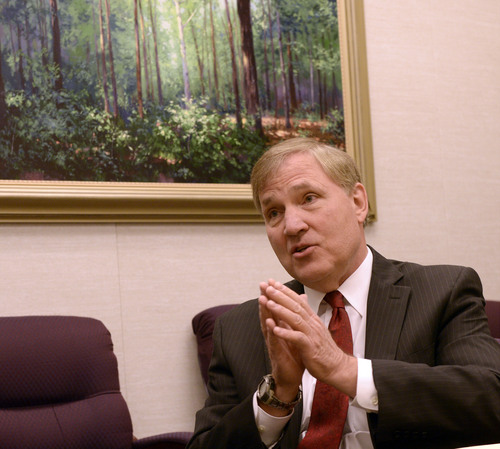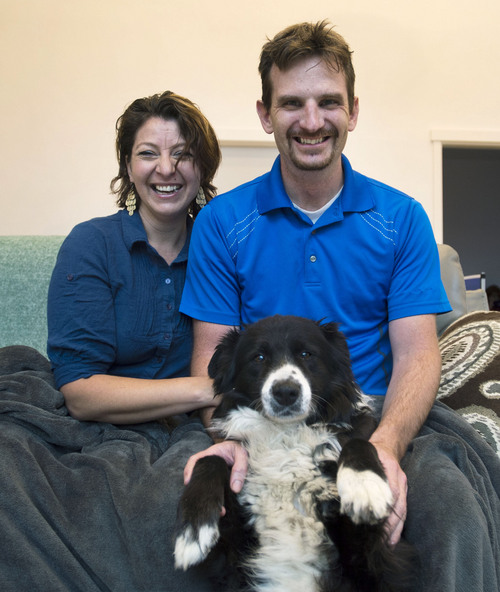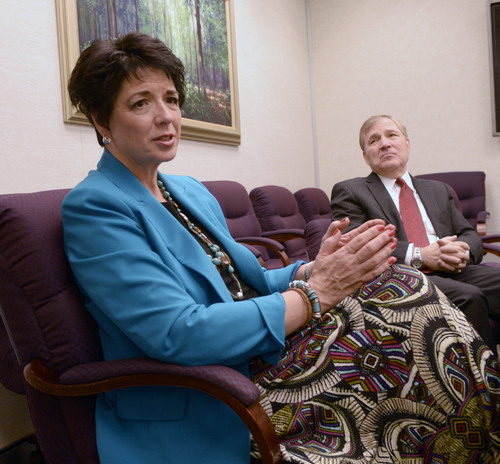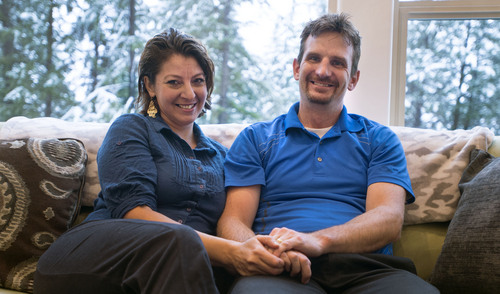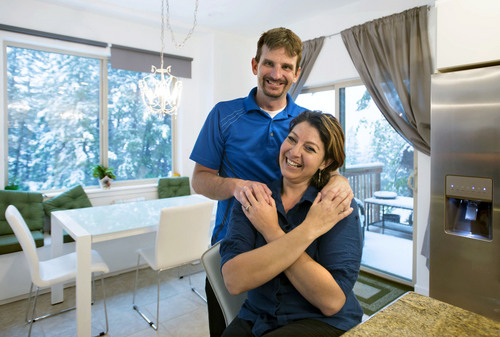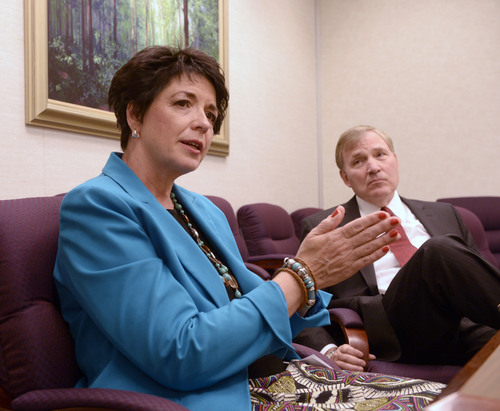This is an archived article that was published on sltrib.com in 2014, and information in the article may be outdated. It is provided only for personal research purposes and may not be reprinted.
The timing of Tuesday's announcement that LDS Family Services is getting out of the adoption business couldn't be worse for Sonia Quiroga Thomas and her husband, Jeff Thomas.
After years of trying unsuccessfully to conceive, undergoing fertility treatments and building a new house designed for a family, the Park City couple attended a Family Services' orientation session for adoptive parents earlier this month.
They had planned to submit their application Thursday to, at long last, become adoptive parents.
And thenQuiroga Thomas read the news that the social services arm of The Church of Jesus Christ of Latter-day Saints would end its decades-long service of matching adoptive parents with children.
"I understand why the church is doing this … but on a personal level, it couldn't be worse timing for me," said Quiroga Thomas, a 41-year-old founder of a nonprofit that helps single mothers in Latin America.
Now, Quiroga Thomas worries that she and her husband, 37, will not be able to afford to adopt.
Subsidized by the LDS Church, faithful Mormon couples who are adopting pay from $4,000 to $10,000, based on their income, according to the agency's website.
Fees charged by other adoption agencies, including birth mother expenses, average about $30,000 and often go higher.
Donna Pope, executive director of Heart to Heart Adoptions, another major Utah agency, said LDS Family Services' exit from adoptions will leave a void.
The higher fees, she said, "are going to be a struggle for adoptive families."
Plus, Pope said, "there is a certain degree of credibility that comes with the church. That's going to be hard for adoptive families to move out of that mind-set."
LDS Family Services still will work with couples who want to adopt and with pregnant women — but as professional counselors, not adoption brokers.
"As a traditional adoption agency, it's not working out for us," said David M. McConkie, manager of services for children at LDS Family Services.
At the heart of the decision is a trend that forced LDS Family Services to reassess how it can best serve Mormons: the fact that few unwed mothers give up their babies for adoption anymore.
Thirty years ago, 15 percent of single pregnant teenagers and young women chose adoption. Today, it's 1 percent nationally and perhaps slightly higher in Utah, McConkie said.
One factor is that the social stigma attached to being an unwed mother has evaporated, explained Sherilyn Stinson, field group manager for LDS Family Services. If anything, there is now a stigma attached to putting one's child up for adoption.
"It's a different world for adoption," she said.
Pope said the typical birth mother today is in her mid-20s and unable to financially take care of the children she already has.
LDS Family Services, however, was set up on a different model, she said. "It was designed toward the 16-year-old who got in trouble and went to her [Mormon] bishop," Pope said. "That doesn't happen anymore. They don't place. They parent."
McConkie said Family Services executives noted that the same-sex-marriage movement has led some Catholic agencies to get out of adoptions, but that was not the driver behind the LDS Church's decision.
In the case of Catholic agencies, government funding is typically involved. LDS Family Services has not accepted public money for its adoption work.
LDS Family Services has 69 field offices across the nation and has been placing 200 to 300 children a year. That's down from 665 in 2002, the peak year.
The number of couples who yearn to adopt, however, remains high. Some of the 600 LDS couples on the agency's list have been waiting as long as three years, Stinson said.
According to the agency's website, only LDS couples who are sealed in a Mormon temple, have temple recommends and are infertile qualify to adopt through Family Services. Expectant mothers of any background, however, are served.
For several years, LDS Family Services has been encouraging couples to explore all options in their quest for a child, Stinson said, whether that meant working with another adoption agency or finding a birth mother on their own.
Now, those partnerships will be more important as counselors at LDS Family Services help couples prepare to adopt and pick the best course for finding a child.
The partners throughout the country, McConkie said, come from various religious and secular backgrounds.
Many couples, he said, will realize that it's cheaper to find a birth mother on their own and have an attorney handle the paperwork.
The changes will be phased in so couples already working with LDS Family Services will not be adversely affected, Stinson said.
For some time, she said, the agency has been encouraging its social workers to get master's degrees and licensed as clinical social workers so they can provide professional counseling.
While LDS Family Services will continue to champion adoption and uphold church teachings on abortion — it's an option only in cases of rape, incest, health of the mother or severe fetal defects — adoption no longer will be the focus of its work with pregnant women, McConkie said.
The focus, he added, "will be on her needs."
If a pregnant woman selects abortion, he said, counselors will make the appropriate referrals.
Becky Davis, the social-service adoption specialist at Children's Service Society, said the change makes sense.
Many expectant mothers, she said, do not turn to LDS Family Services because they want mental health, not religious, counseling.
But Mormon couples seeking to adopt may be in for "sticker shock," Davis said. LDS Family Services' fee is considerably lower than other adoption agencies' fees.
Children's Service Society, which was one of Utah's largest adoption agencies several decades ago, is now one of the smaller ones and has a base adoption fee of $30,000. "Others are as high as $50,000 to $55,000," Davis said.
Wes Hutchins, a Utah lawyer who handles adoptions and has represented a number of birth fathers fighting for parental rights, predicts that adoption agencies and attorneys will be busier.
"We're going to see a dramatic increase in the do-it-yourself adoption. They can go to the Internet and make connections with biological mothers and fathers who are contemplating adopting."
Quiroga Thomas said she and her husband will pursue several possibilities. They are now licensed to be foster parents or to adopt children whose birth parents have lost their parental rights. She also is tapping into social media to let friends and family members know they're looking to adopt.
"You have to use all the resources you have," she said.
Twitter: @KristenMoulton What's effect of church's exit from adoptions
12:15 p.m. Wednesday • The LDS Church will no longer be a full-service adoption agency, with LDS Family Services shifting from front-line adoption brokers to counselors to expectant mothers and families considering adoption. Donna Pope of Heart to Heart Adoptions, Becky Davis of Children's Service Society, prospective adoptive mom Sonia Quiroga Thomas and Tribune reporter Kristen Moulton join Jennifer Napier-Pearce to discuss how the change will affect birth moms, adoptive families and adoption services in Utah. You can join in by sending questions and comments to #TribTalk on Twitter and Google+. You can also text comments to 801-609-8059. › sltrib.com


